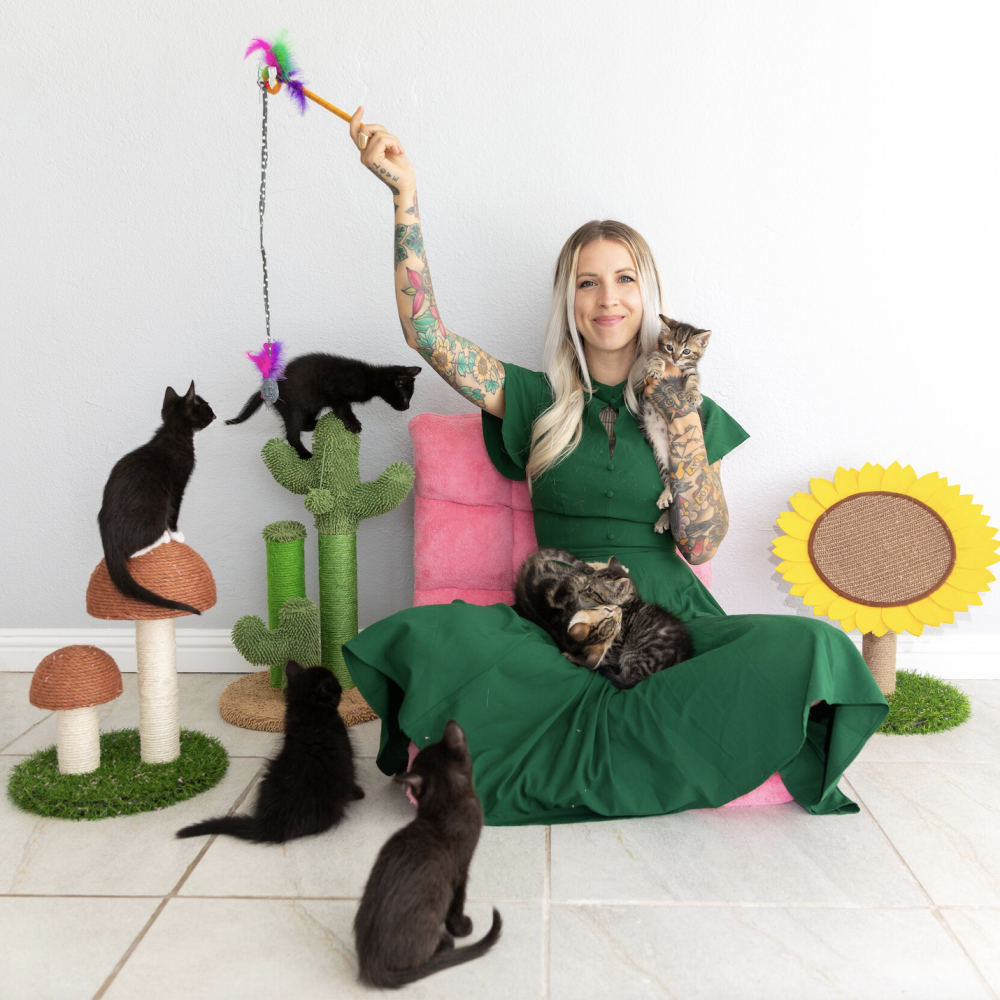
Hannah Shaw
Activist & Author
Hannah Shaw is a kitten rescuer, humane educator, and New York Times-bestselling author who has dedicated her life to finding innovative ways to protect animals. Her project, Kitten Lady, strives to create global change in the way we perceive and treat the tiniest and most vulnerable felines.
Shaw is the author of the bestselling book Tiny But Mightyopens in a new tab (Penguin Random House, 2019), Kitten Lady’s Big Book of Little Kittensopens in a new tab (Simon and Schuster, 2019), Kitten Lady’s CATivity Bookopens in a new tab (Harper Collins, 2022), and the Adventures in Fosterlandopens in a new tab chapter book series (Simon and Schuster). She has been featured as an expert on Animal Planetopens in a new tab and has received several awards for her advocacy work, including the 2019 Cat Advocate of the Yearopens in a new tab award by ASPCA.
Shaw is also the founder of Orphan Kitten Clubopens in a new tab, a 501(c)3 charitable organisation in the US, which provides lifesaving programmes including a neonatal kitten nurseryopens in a new tab, a TNR programmeopens in a new tab, and the world’s first grant programmeopens in a new tab specifically funding innovation in kitten welfare. Since 2019, her nonprofit has provided more than $1 million [approximately £827,000] in funding to shelters and rescues to further the cause of neonatal kitten welfare.
What inspired you to work with animals?
I have been an animal lover my whole life, but I was not involved in cat welfare at all. When I was 21, I was living in Philadelphia, and I went to a public park, and I looked up into a tree, and there was a little kitten in the tree. She was quite high up, and I climbed the tree somehow. I’m like the least athletic person in the world; I almost felt as if I blacked out and ended up at the top of a tree now saving the kitten. I picked her up, and I remember putting her in my shirt and shimmying down the tree. I had no clue what I was doing.
I convinced my roommate to let me bring her home, ’cause I didn’t know what else to do. And of course I fell in love with her. Shortly after that, I started seeing kittens outside all the time. I think that my eyes just opened to what was going on in that community. And so I became very interested in helping.
How has your work evolved during the pandemic?
Covid had a really interesting impact on kittens, specifically. Every once in a while in your life, you have a moment where things just change – and a big moment for me, where I felt like I suddenly was able to make quite a large impact was at the beginning of the pandemic. It became immediately evident that shelters were not going to be able to be fully staffed, and animals were going to have to leave the shelters. And so I was like, “OK what can I do?”
A lot of people are afraid to foster because they have these sort of preconceived ideas of what it takes to be able to do that. My belief is that anybody can foster; not everybody can foster the same populations. Now, suddenly you had this situation where not only is there this huge need for animals to get out of shelters, but simultaneously everybody is at home. I decided I was going to do a webinar series where every weekend for four weeks, I would offer classes online live and see if anybody wants to attend. I think there were up to at one point 65,000 people watching live.
Can you tell us more about your nonprofit, the Orphan Kitten Club, and the grants it’s able to give?
One thing that I’m really proud of is that my nonprofit started the first and only grant programme for kittens. It’s called the Mightycat Program. We are so passionate about hands-on work that we’re able to do, but we want other organisations to be able to do the same. So we started this grant programme and it’s 100 percent dependent on donations – we have been able to donate over a million dollars [approximately £827,000] to 55 partner organisations throughout the United States, for everything from building kitten nurseries to helping them create their foster supply kits to helping with individual medical cases for kittens. We have even funded staff positions for shelters.